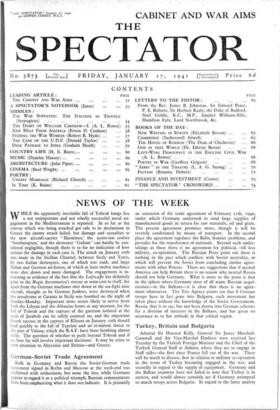German-Soviet Trade Agreement
Both in Germany and Russia the Soviet-German trade agreement signed in Berlin and Moscow at the week-end was acclaimed with enthusiasm, but none the less, while Germans appear to regard it as a political triumph, Russian commentators have been emphasising what it does not indicate. It is primarily, an extension of the trade agreement of February 11th, 19405 under which Germany undertook to send large supplies of manufactured goods in return for raw materials, oil and grain. The present agreement promises more, though it will be- severely conditioned by means of transport. In the second place the agreement regulates the Baltic frontier problems, and provides for the transference of nationals. Beyond such under- takings as these there is no agreement for political, still less military, co-operation. The Russian Press point out there is nothing in the pact which conflicts with Soviet neutrality, or which will prevent the Soviet from concluding similar agree- ments with other Powers. There are suggestions that if neutral America can help Britain there is no reason why neutral Russia should not help Germany. What is more to the point is that in the sphere where Germany most of all wants Russian acqui- escence—in the Balkans—it is clear that there is no agree- ment whatsoever. The Tass Agency points out that if German troops have in fact gone into Bulgaria, such movement has taken place without the knowledge of the Soviet Government. Russia, that is to say, has not been drawn into German schemes for a division of interests in the Balkans, and has given no assurance as to her attitude in that critical region.






























